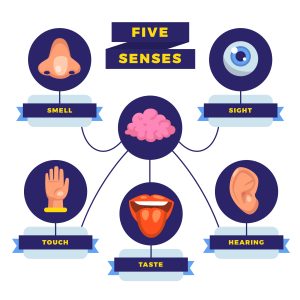Sensory Processing
What is the Sensory System?
The sensory system helps us take in information from the world around us and respond to it. The senses most people think of are sight, smell, touch, taste, and hearing. However, two other important senses are proprioception and vestibular. Proprioception helps you know where your body is in space, and vestibular helps you maintain your balance. Sensory information is important for the brain and helps individuals function in daily life.1

Sensory System and Domestic Violence
Individuals who have experienced domestic violence may have difficulty responding to sensory information properly. This happens because the body’s “fight or flight” response is repeatedly activated by a potential danger or threat. When this response is repeatedly turned on it can lead to an over-responsive or under-responsive sensory system. 2
- Over-responsive sensory system: Your body is quick to take in information from the environment and alerts your brain of a potential threat even when there is no threat.3
- Under-responsive sensory system: Your body is slow to take in information from your environment and respond to it even if there is a potential threat present.3
Regulating the Sensory System
There are several different activities you can use to regulate the sensory system. These activities work by engaging your senses in an activity which can have a calming effect on your nervous system. Click on the chart below to learn more about Neff’s (n.d.) recommendations.4
DISCLAIMER: The sensory system is unique to every individual and what works for some might not work for others. If you feel that these strategies do not help or make your symptoms feel worse, it would be beneficial to speak with an occupational therapist. Occupational therapists are trained in assessing and creating individualized plans to meet your sensory processing needs.
Key Takeaways
- The sensory system is important for taking in information from the environment and responding to it.
- Survivors of domestic violence may experience an over-responsive or under-responsive sensory system.
- Strategies for regulating the sensory system include engaging the senses in activities (e.g. eating a comfort food, using a weighted blanket, etc.)
